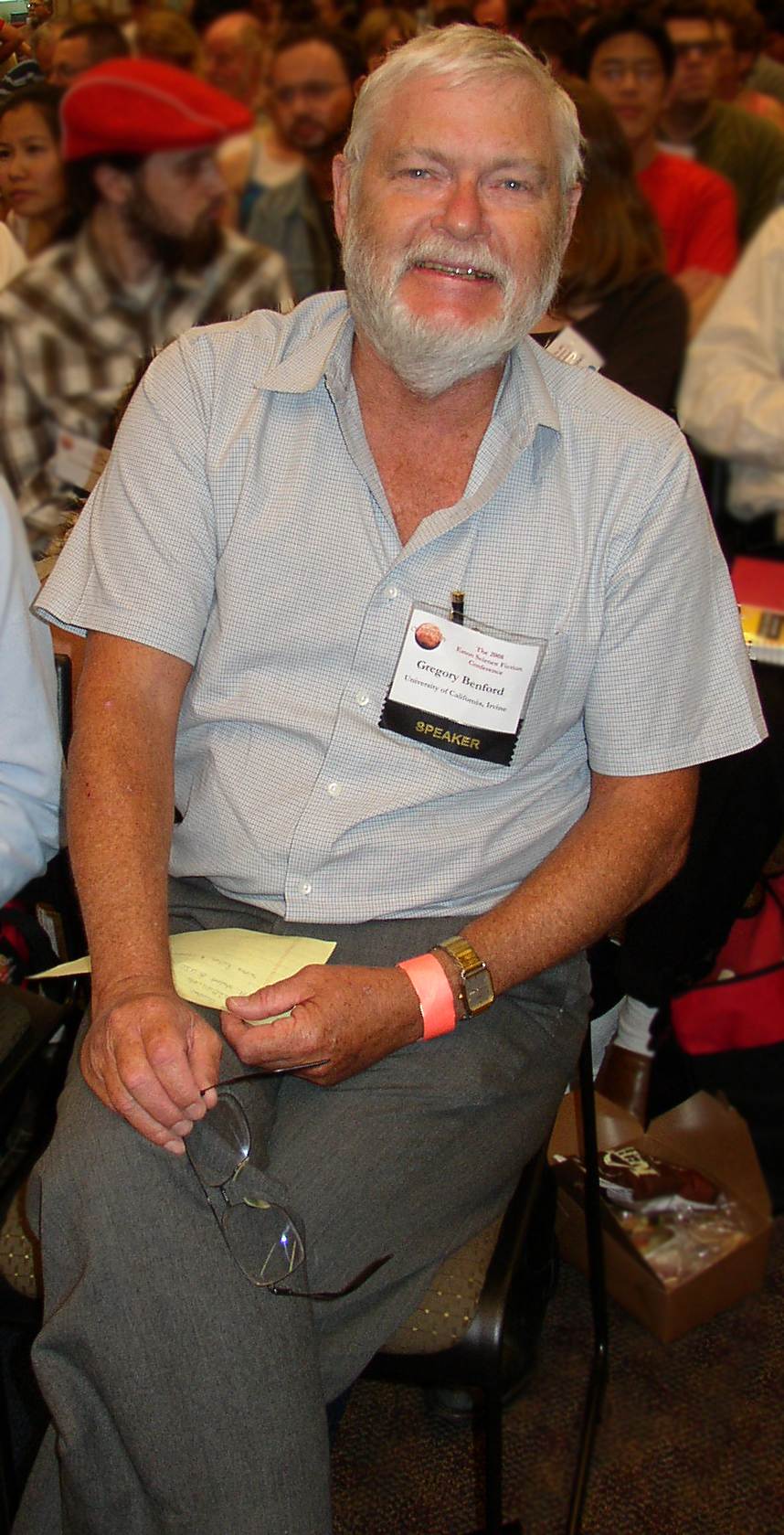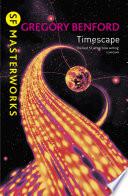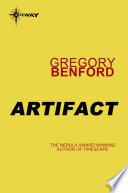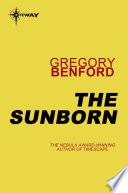Part 6 “Aleph Null”, Chapter 4 (p. 226)
Against Infinity (1983)
Works

In the Ocean of Night
Gregory Benford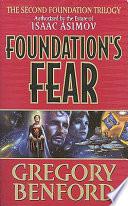
Foundation's Fear
Gregory BenfordFamous Gregory Benford Quotes
“Trouble comes looking for you if you’re a fool.”
To the Storming Gulf, p. 126 (Originally published in Fantasy & Science Fiction, April 1985)
In Alien Flesh (1986)
“Soldiers for equality, uh? Glad you warned me. I’d have thought you were just thieves.”
Part 4 “Hiruko: Six Years Later”, Chapter 1 (p. 148)
Against Infinity (1983)
Nooncoming, p. 100 (Originally published in Universe 8, edited by Terry Carr), 1978
In Alien Flesh (1986)
Part 2 “Aleph”, Chapter 2 (p. 51)
Against Infinity (1983)
Gregory Benford Quotes about people
Part 2, Chapter 6 (p. 76)
Artifact (1985)
Part 5 “Coming Home”, Chapter 3 (p. 179)
Against Infinity (1983)
Afterword to Nooncoming, p. 104
In Alien Flesh (1986)
White Creatures, p. 170 (Originally published in New Dimensions 5, edited by Robert Silverberg), 1975
In Alien Flesh (1986)
“You know, my dear, you’re wrong that suffering ennobles people.”
She’d stopped to massage her hip, wincing. “It simply makes one cross.”
Nooncoming, p. 100 (Originally published in Universe 8, edited by Terry Carr), 1978
In Alien Flesh (1986)
“She could not understand why people feared new ideas. She was frightened by the old ones.”
Source: Short fiction, Vortex, p. 111
Gregory Benford Quotes about science
Exposures, p. 244
In Alien Flesh (1986)
Afterword to Exposures, p. 246
In Alien Flesh (1986)
“Science is about continuity of ideas, a web of connections.”
“A Scientist’s Notebook: Life on Mars?” in Fantasy & Science Fiction, February 1997, p. 119
Part II, Chapter 4, “Disbelief” (p. 104)
The Sunborn (2005)
Gregory Benford: Trending quotes
“Deep ignorance, but still a kind that knew its limits. The limits were crucial.”
Source: Timescape (1980), Chapter 31 (p. 360)
Context: You had to form for yourself a lucid language for the world, to overcome the battering of experience, to replace everyday life’s pain and harshness and wretched dreariness with — no not with certainty but with an ignorance you could live with. Deep ignorance, but still a kind that knew its limits. The limits were crucial.
“Passion was inversely proportional to the amount of real information available.”
Source: Timescape (1980), Chapter 14 (p. 182, known as Benford's law of controversy)
Context: It was an example of what he thought of as the Law of Controversy: Passion was inversely proportional to the amount of real information available.
The Snark, p. 195
In the Ocean of Night (1977)
Context: Organic forms are in the universe of things and also reside in the universe of essences. There we cannot go. … You are a spontaneous product of the universe of things. We are not. This seems to give you … windows. It was difficult for me to monitor your domestic transmissions, they fill up with branches, spontaneous paths, nuances…
Gregory Benford Quotes
“Talkers never acted when they could talk.”
Redeemer, p. 53 (Originally published in Analog, April 1979)
In Alien Flesh (1986)
Time’s Rub, pp. 260-261
In Alien Flesh (1986)
Part 6 “Aleph Null”, Chapter 3 (p. 221)
Against Infinity (1983)
“(Crank theories) always violated the first rule of a scientific model: they were uncheckable.”
Source: Timescape (1980), Chapter 17 (p. 235)
“The role of boredom in human history is underrated.”
Doing Lennon, p. 266 (Originally published in Analog, April 1975)
In Alien Flesh (1986)
“No matter how much you plan for it, the real thing seems curiously, well, unreal.”
Source: Timescape (1980), Chapter 37 (p. 395)
Doing Lennon, p. 268
In Alien Flesh (1986)
“Disintegration of structure equals information loss.”
The Snark, a member of a machine-intelligence civilization, p. 195
In the Ocean of Night (1977)
“To shine is better than to reflect.”
Source: Timescape (1980), Chapter 16 (p. 220)
Source: Timescape (1980), Chapter 16 (p. 229)
Part 2, Chapter 6 (p. 80; ellipsis represents a minor elision of narration)
Artifact (1985)
“Religions do not teach doubt.”
Source: Timescape (1980), Chapter 27 (p. 322)
“The past was a jigsaw puzzle and you never had all the pieces.”
Part 1, Chapter 1 (p. 10)
Artifact (1985)
Source: Timescape (1980), Chapter 11 (p. 146)
“Man doesn’t have to take a gamble just ’cause it’s there. You got to learn that.”
Part 2 “Aleph”, Chapter 3 (p. 68)
Against Infinity (1983)
“Every boy knows he is immortal, but his parents, they are not so sure.”
Part 2 “Aleph”, Chapter 1 (p. 45)
Against Infinity (1983)
“But the answers come when they will, one piece at a time.”
Exposures, p. 232 (Originally published in Asimov’s, July 6, 1981)
In Alien Flesh (1986)
“The personal was, compared with the tides of great nations, a bothersome detail.”
Source: Timescape (1980), Chapter 43 (p. 441)
Part 2, Chapter 1 (p. 42)
Artifact (1985)
Part 2 “Aleph”, Chapter 3 (p. 68)
Against Infinity (1983)
““Free will again,” Cathy said.
“Or free won’t,” Peterson said mildly.”
Source: Timescape (1980), Chapter 23 (p. 291)
Part 4, Chapter 1 (pp. 155-156)
Artifact (1985)
“Just because something’s crazy, doesn’t mean it’s wrong.”
Part 5, Chapter 1 (p. 228)
Artifact (1985)
“Must admit it felt good. First time in years anybody ever admitted I was right.”
To the Storming Gulf, p. 142
In Alien Flesh (1986)
“Any technology that does not appear magical is insufficiently advanced.”
This is derived from the third of Arthur C. Clarke's three laws : "Any sufficiently advanced technology is indistinguishable from magic." There are other variants which had inverted this including one known as Gehm's corollary http://www-users.cs.york.ac.uk/susan/cyc/l/law.htm, published several years earlier : "Any technology distinguishable from magic is insufficiently advanced." The earliest variant seems to be "Any sufficiently advanced magic is indistinguishable from technology." It has been called "Niven's Law" and attributed to Larry Niven by some, and to Terry Pratchett by others, but without any citation of an original source in either case — the earliest occurrence yet located is an anonymous one in Keystone Folklore (1984) by the Pennsylvania Folklore Society.
Foundation's Fear (1997)
“There’s plenty—”
“Plenty is exactly what there’s none of.”
Part 2 “Aleph”, Chapter 6 (p. 87)
Against Infinity (1983)
““The peers just fill the air with their speeches.”
“And from what I've seen, vice versa.””
Source: Timescape (1980), Chapter 5 (p. 46)
“Thunder impresses, but it’s lightning does the work.”
Time’s Rub, p. 253 (Originally published in Asimov’s, April 1985)
In Alien Flesh (1986)
Part 6 “Aleph Null”, Chapter 4 (p. 226)
Against Infinity (1983)
“At least being prosperous set one apart in England; here it guaranteed nothing, not even taste.”
Source: Timescape (1980), Chapter 11 (p. 134, concerning the USA)
“Modern economics and the welfare state borrowed heavily on the future.”
Source: Timescape (1980), Chapter 43 (p. 445)
“There was something about such reflex stupidity that never failed to irritate him.”
Source: Timescape (1980), Chapter 17 (p. 231)
“They will do anything for the worker, except become one.”
Source: Timescape (1980), Chapter 5 (p. 46, concerning the peers)
Part 1 “Beyond Sidon”, Chapter 2 (p. 12)
Against Infinity (1983)
Artifact (1985), Part 4, Chapter 4 (p. 186)
Source: Timescape (1980), Chapter 11 (p. 136)
Source: Timescape (1980), Chapter 25 (p. 305)
Part 5, Chapter 3 (p. 243)
Artifact (1985)
“Somehow to them, the press was always the judge of things scientific.”
Source: Timescape (1980), Chapter 17 (p. 236, concerning cranks)
Source: Timescape (1980), Chapter 10 (p. 110, concerning the nuclear club)
“He didn’t regret growing older, it was a privilege denied to many.”
Source: Short fiction, The Man Who Sold The Stars (2013), p. 342
Source: Short fiction, The Man Who Sold The Stars (2013), p. 338
